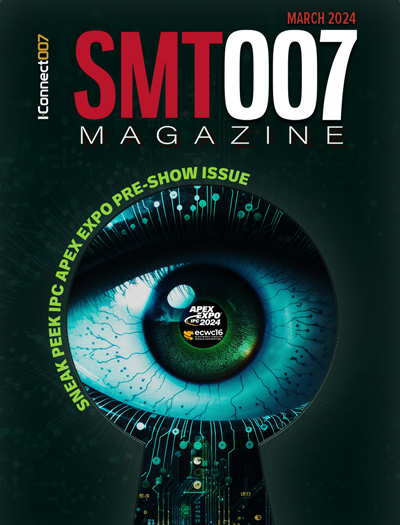-

- News
- Books
Featured Books
- smt007 Magazine
Latest Issues
Current Issue
Box Build
One trend is to add box build and final assembly to your product offering. In this issue, we explore the opportunities and risks of adding system assembly to your service portfolio.

IPC APEX EXPO 2024 Pre-show
This month’s issue devotes its pages to a comprehensive preview of the IPC APEX EXPO 2024 event. Whether your role is technical or business, if you're new-to-the-industry or seasoned veteran, you'll find value throughout this program.

Boost Your Sales
Every part of your business can be evaluated as a process, including your sales funnel. Optimizing your selling process requires a coordinated effort between marketing and sales. In this issue, industry experts in marketing and sales offer their best advice on how to boost your sales efforts.
- Articles
- Columns
Search Console
- Links
- Events
||| MENU - smt007 Magazine
Deciphering the Presidential Determination
April 3, 2023 | Nolan Johnson, I-Connect007Estimated reading time: 6 minutes
On March 27, 2023, U.S. President Biden issued a presidential determination that, IPC states, “prioritizes the domestic development of printed circuit boards (PCBs) and advanced packaging, including IC substrates, under Title III of the Defense Production Act (DPA).
IPC welcomes this action, but what does this really mean? IPC vice president of global government relations, Chris Mitchell, joins Nolan Johnson to clarify what a presidential determination is, what it means to both the industry and individual companies.
Audio Transcript:
IPC’s Chris Mitchell, vice president of global government relations, explains the March 27 Presidential Determination for Printed Circuit Boards and Advanced Packaging.
Nolan Johnson: Hi, Nolan Johnson here for Real Time with… I-Connect007, and I have the pleasure of speaking with Chris Mitchell. He is the vice president of global government relations for IPC. Chris, welcome.
Chris Mitchell: Thanks, Nolan. It's always great to be with you.
Johnson: On Monday this week, March 27, IPC put out a press release welcoming the U.S. presidential determination prioritizing domestic development of printed circuit boards and IC substrates. That's pretty newsy.
Mitchell: Yes, it was. A big development and one that's been—quite frankly—a long time in coming. We're exuberant that it was issued on Monday and it's notable that it came out, really, on the heels of an announcement on Friday, while the president was in Canada that the U.S. would be committing, through the Defense Production Act, $50 million for the strengthening of the U.S. PCB and advanced packaging industries.
Johnson: How is a determination different from an executive order?
Mitchell: First, the Defense Production Act, over its 70-plus year history, has evolved in order to allow the president and the U.S. government to more broadly address any number of Industrial Base issues. In this case, the president issued a presidential determination. This comes through in the form of a memorandum to the secretary of defense. And it is the president's mechanism for, one, identifying an Industrial Base need as a strategic national priority in the interests of our nation's defense. And in addition, providing exemptions to certain requirements that many industries under the Defense Production Act program would normally need to meet in order to secure the kind of benefits and opportunities that that the program can afford. I think what we see in this presidential determination is, at the very highest levels of the U.S. government for the first time—at least in recent history—an affirmation that the printed circuit board industry is of significant strategic importance to the nation. By designating the industry as having that strategic national importance, it then gives the industry the ability to leverage the Defense Production Act to ramp up production and innovation.
Johnson: Now, this is the first time that's coming from the president himself. However, there has been quite a bit of activity in the past few months that have telegraphed this.
Mitchell: Yes. But clearly the government's been preparing for this. The Defense Department is not alone, but certainly taking the lead in helping to provide a greater level of support for the industry given the significant vulnerabilities that exist.
Johnson: How do you see this affecting the CHIPS Act and any subsequent legislation following behind, such as a new version of last Congress's HR 7677?
Page 1 of 2
Suggested Items
Marcy's Musings: The Growing Industry
04/16/2024 | Marcy LaRont -- Column: Marcy's MusingsAfter decades of steady decline in the U.S. and Europe, the PCB industry is finally growing, especially in China Plus One countries. The U.S. for example, which seemed to have abdicated its title as the world leader in innovating high-technology cutting-edge manufacturing processes, is now in a race to regain what it lost and then some. The PCB fabrication industry is growing in the West, thanks to DoD funding, the CHIPS and Science Act, and hopefully, the passing of HR 3249, the Printed Circuit Board and Substrates Act.
PCB007 Magazine April 2024 — The Growing Industry Issue
04/15/2024 | I-Connect007 Editorial TeamAfter more than two decades of steady decline in the U.S., the PCB industry is finally growing in the West thanks to the CHIPS and Science Act, DoD funding, and hopefully, the passing of HR 3249, the Printed Circuit Board and Substrates Act. The U.S. is now in a race to regain what was lost and then some. But what does “growing” look like for the organizations that have received DoD funding, and for the rest of us? How can we sustain this growth?
Groundbreaking Ceremony Marks the Beginning of a New Era for Newccess Industrial; The Construction of the MINGXIN Building
04/12/2024 | Newccess IndustrialOn a clear and sunny day in March, the groundbreaking ceremony for the MINGXIN Building took place in Shenzhen, China. This moment marked the official commencement of construction for a project that will reshape the semiconductor materials industry.
SEMI Issues Statement on Change to U.S. CHIPS Act Notice of Funding Opportunity
04/11/2024 | SEMISEMI, the industry association serving the global electronics design and manufacturing supply chain, issued the following statement from Ajit Manocha, SEMI President and CEO, after the United States Government announced it will no longer move forward with the Notice of Funding Opportunity for CHIPS funding for the construction, modernization, or expansion of semiconductor research and development (R&D) facilities in the United States:
IFTEC’s Pierre-Jean Albrieux Inducted into the IPC Raymond E. Pritchard Hall of Fame at IPC APEX EXPO 2024
04/11/2024 | IPCIn recognition of his extraordinary contributions to IPC and the electronics manufacturing industry, Pierre-Jean Albrieux, president of IFTEC-France, was inducted into the IPC Raymond E. Pritchard Hall of Fame at IPC APEX EXPO 2024. IPC’s most prestigious honor, the Hall of Fame Award is given to individuals who have provided exceptional service and advancement to IPC and the electronics industry.


